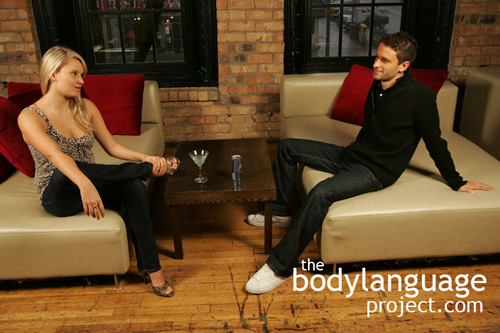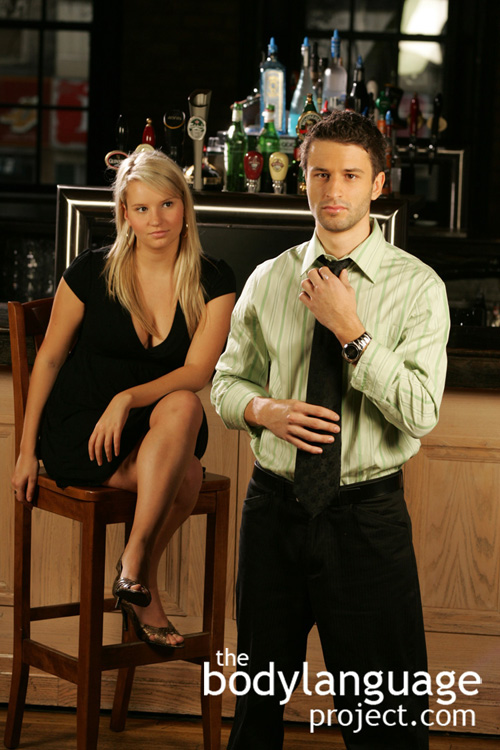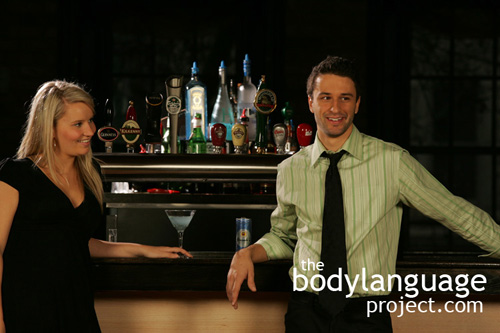
Leaning back and taking up space is a way to show that we own the joint.
It might seem counter-intuitive, but taking on a relaxed position and postures when around others, such as slumping in your chair can be a way to increase your status. This might be opposite to what you would expect given the rules of height and power but slouching shows to everyone that you are comfortable with yourself and don’t feeling anxious by someone else’s presence. By extension, most people will find it difficult to relax when in the presence of higher ranking people. Therefore it follows that if someone shows relaxed body postures, they must be high ranking! Subconsciously, we do think this, although, when we know definitively that we outrank our slouching counterpart, we find them to be brazen and ignorant which fosters more negative attitudes. This can go both ways, and it will be up to you which route you take. Do you want to fit in, or “rock the boat”, so to speak.
Imagine entering your boss’s office because he wants to speak to you about your performance. You promptly sit down, without permission, and slam your feet on top of his desk taking up an ownership (comfortable) position. Without question, he will take offense. The rare exceptions can happen though. Say you are close personal friends on top of your work relationship, or maybe you are of similar rank in the office, say partners. What would happen if instead of putting your feet up on his desk you instead slouch over the arm rest and open your legs? While this isn’t equally as offensive, it will come across as a challenge to your boss’s dominance and put him on edge. In subordinate/dominant relationship relaxed body language quickly upset whatever hierarchy was thought to have existed setting the tone for future struggles which may or may not be your ultimate goal.
When competing with those of equal status, relaxed and dominant body language can help, rather than hinder, your chances of success because it will set you above your competitors without using risky verbal language.
Let’s take another example where the new boyfriend enters his girlfriend’s house, sits down on the sofa, and makes himself at home totally oblivious to her father. The boyfriend has set a competitive tone and if not challenged by Dad, he will continue to experience the upper hand. His relaxed ownership has said to his girlfriends father that he is willing (but possibly not able – this is yet to play out), to usurp his daughter’s interest and therefore take over his role as her caregiver. If Dad is a pusher-over, the boyfriend wins. Smart Dad’s set the rules early and emphatically by polishing their guns in their rocking chairs on the front porch!
As we see, territoriality means everything to relaxed postures. Where appropriate, such as with close friends of equal rank, relaxed postures are insignificant, but when they happen within someone else’s boundaries, they send a powerful message that are especially salient to the person who has laid claimed to such boundaries. The owner of the property, wherever it might be, would much rather see cautious and reserved body language from those entering their boundaries as a signal of respect. No matter the result of the challenge, relaxed body language can help set the stage to achieve higher status. When the challenge is not met, the user of relaxed body language enjoys his “free lunch”, and with this comes freedom to choose and control future scenarios.
So far we have examined how relaxed body language can set up nonverbal power struggles between those of differing rank, however, they can also maintain power rank when used by higher status individuals in lower ranking person’s territory, or to tip the balance, when use by those in equal rank. To see those of equal rank struggle for power, carefully examine the body language of leaders when they meet. One of the best examples is when presidents and prime ministers, leaders of entire countries, meet and jockey for the upper hand. Which leader appears more at home, relaxed, calm and collected? Which one fidgets, or pulls at a collar, or tries to keep himself in the picture? You can learn a lot by how leaders act when confronted with those of equal status.
I have mentioned a few examples thus far depicting relaxed body postures such as slouching in a chair and tossing the legs up on a desk. They can also include leaning further back far in a chair, sitting deep inside a comfy sofa (versus sitting at the edge in a ready position) dangling an arm over the back of the chair, opening up the legs instead of crossing them, generally taking up more space and more open body positions. A particularly obvious territorial display of confidence, authority and ownership is achieved by spreading the finger tips on a desk carrying part of the body’s weight while standing hunched over it. Onlookers will respect that the desk is in full control of the person carrying this posture. If you want to know exactly how much trouble someone is going to give you, meaning just how authoritative they are, just watch for how wide they spread themselves out across a surface. For example, a store clerk might watch just how far the arms are splayed across the top of the counter. The more spread the arms, the more trouble is coming their way. We see this type of body language most often when there is a customer service issue where a sale failed to please. The gesture will be accompanied by verbal demands and displeasure.
Relaxed body postures are really all about spreading out, taking up more space and looking as if you own your environment so if your goal is to show ownership, picture yourself in your own domain, and transport this frame of mind wherever you happened to be.
Of course with this type of body language there needs to be a disclaimer about intent. Most people, especially high ranking people, are normally protective of their property (whatever this happens to be – their house, office or favourite chair) so usurping their stuff, has the potential to alienate them, which is why you really should consider what type of battle you are orchestrating. By extension, more submissive gestures can serve to help gain someone else’s trust and instill in them a desire to help, which can sometimes be a more effective way to achieve your goals.





